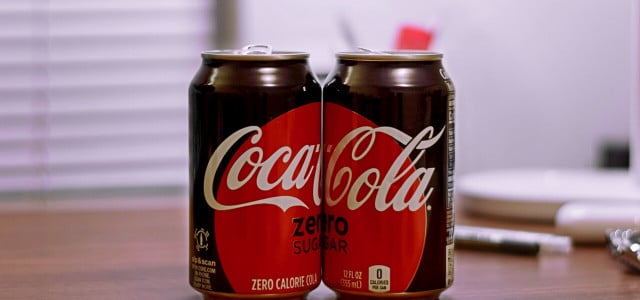
The sweetener aspartame is used in many drinks and foods. According to the WHO, it is now considered “possibly carcinogenic”. What does that mean for people who consume the sweetener?
Is the sweetener aspartame in diet coke or chewing gum possibly carcinogenic? The International Agency for Research on Cancer (IARC) says yes. The WHO has now classified the sweetener aspartame as “possibly carcinogenic”. At the same time, however, the WHO gives the all-clear: Anyone who does not exceed the applicable recommendations for maximum daily amounts does not expose themselves to a higher risk of cancer, they say. What is known about the sweetener:
What is aspartame?
Aspartame is a synthetically produced low-calorie sweetener. According to the European Food Safety Authority (EFSA), it is about 200 times sweeter than sugar. Aspartame has been approved for human consumption for many years, for example as a tabletop sweetener or in foods such as soft drinks, chewing gum, yogurt, ice cream, mustard, sauces, toothpaste, cough syrup and some vitamin tablets. The sweetener must be indicated on the label, either by name or by its E number (E951). But consumers usually do not find out how much of it is in the product.
What does the IARC classification mean?
The IARC assesses whether a substance could cause cancer in humans in general. It divides tested substances into three categories: “possibly carcinogenic”, “probably carcinogenic” and “carcinogenic”. Aspartame was first studied and landed in the “possibly carcinogenic” category, along with 320 other substances. However, the IARC does not take into account how much a person would have to eat to be at risk of the disease. It is therefore possible that a substance is classified as possibly carcinogenic, but the amount that a person usually ingests through food is so small that the risk is considered negligible. This is exactly the case with aspartame.
What does the WHO say?
Unlike the IARC, it does a risk analysis and takes into account the amount consumed. She considers the studies used by the IARC to be not clear enough. That is why she considers consumption within the scope of her previous daily maximum recommendations to be harmless.
What is the maximum amount of aspartame people should consume each day?
According to EFSA and WHO, the acceptable daily intake (ADI) is 40 milligrams per kilogram of body weight. This amount can be taken throughout life without hesitation. In order to reach this value, a person weighing 70 kilograms would have to drink 9 to 14 cans of conventionally sized diet drinks with a high aspartame content per day, according to the WHO. However, the amounts of sweetener vary depending on the drink and manufacturer. Coca-Cola Switzerland reported in 2020 that in Switzerland Coca-Cola zero and Coca-Cola light contained around 130 milligrams of aspartame per liter. A 70-kilogram person could then theoretically drink more than 20 liters a day before hitting the recommended maximum amount.
Should we avoid foods with aspartame in the future?
The WHO reassures: There is no reason for this as long as you stay below the daily maximum levels. The Federal Institute for Risk Assessment (BfR) says that aspartame is one of the best-researched sweeteners and one that has been repeatedly evaluated by international expert committees. The BfR has no concerns either. Nevertheless, the WHO generally advises reducing both sugar and sweeteners. It would be better to sweeten with fruit.
Are sweeteners healthier than conventional sugar?
According to the German Society for Nutrition (DGE), sweeteners are a good alternative to sugar to prevent tooth decay. However, sweeteners per se do not make you slim. With a balanced diet and exercise, however, they could help you lose weight because they do not provide any energy. The WHO came to a different conclusion in May. She advised against using sugar-free sweeteners for weight control. This only helps in the short term to lose weight or not to gain any more weight. According to studies, long-term consumption in adults increases the risk of type 2 diabetes and cardiovascular diseases, among other things. According to the WHO, sugar-free sweeteners include all synthetic and natural sweeteners, including products from the Stevia plant.
Is the suspicion that aspartame could cause cancer new?
The suspicion has existed for a long time without being clearly confirmed in studies. The three new studies with humans, which the IARC used as a basis, are only of limited significance. In animal studies, there were indications of a cancer risk with extremely high amounts of sweeteners, says DGE spokeswoman Antje Gahl. “However, the quantities are not at all usual for human consumption or are disproportionately high, so that no direct indications for humans could be derived.”
Read more on Techzle.com:
- Zero drinks & Co.: WHO is considering classifying aspartame as carcinogenic
- Sugar substitutes and sweeteners: Differences and facts worth knowing
- Advantame (E969): What you need to know about the sweetener